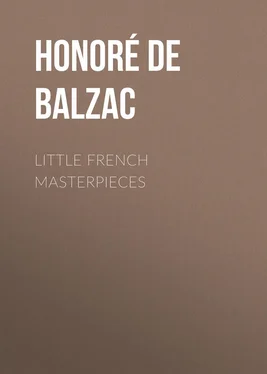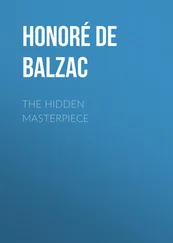Honoré Balzac - Little French Masterpieces
Здесь есть возможность читать онлайн «Honoré Balzac - Little French Masterpieces» — ознакомительный отрывок электронной книги совершенно бесплатно, а после прочтения отрывка купить полную версию. В некоторых случаях можно слушать аудио, скачать через торрент в формате fb2 и присутствует краткое содержание. Жанр: foreign_antique, foreign_prose, на английском языке. Описание произведения, (предисловие) а так же отзывы посетителей доступны на портале библиотеки ЛибКат.
- Название:Little French Masterpieces
- Автор:
- Жанр:
- Год:неизвестен
- ISBN:нет данных
- Рейтинг книги:5 / 5. Голосов: 1
-
Избранное:Добавить в избранное
- Отзывы:
-
Ваша оценка:
- 100
- 1
- 2
- 3
- 4
- 5
Little French Masterpieces: краткое содержание, описание и аннотация
Предлагаем к чтению аннотацию, описание, краткое содержание или предисловие (зависит от того, что написал сам автор книги «Little French Masterpieces»). Если вы не нашли необходимую информацию о книге — напишите в комментариях, мы постараемся отыскать её.
Little French Masterpieces — читать онлайн ознакомительный отрывок
Ниже представлен текст книги, разбитый по страницам. Система сохранения места последней прочитанной страницы, позволяет с удобством читать онлайн бесплатно книгу «Little French Masterpieces», без необходимости каждый раз заново искать на чём Вы остановились. Поставьте закладку, и сможете в любой момент перейти на страницу, на которой закончили чтение.
Интервал:
Закладка:
 F. Brunetière
F. Brunetière
The Unknown Masterpiece
TO A LORD:
* * * * * *
* * * * * *
* * * * * *
1845.
I
GILLETTE
Late in the year 1612, one cold morning in December, a young man whose garments seemed very thin was walking before the door of a house on Rue des Grands-Augustins, Paris. After pacing that street for a long time, with the indecision of a lover who dares not pay a visit to his first mistress, however kind she may be, he at last crossed the threshold of the door and asked if Master François Porbus was at home. Upon receiving an affirmative reply from a woman who was sweeping a room on the lower floor, the young man went slowly up-stairs, hesitating from stair to stair, like a courtier of recent creation, apprehensive of the greeting which he was to receive from the king. When he reached the top of the winding staircase, he stood for a moment on the landing, uncertain whether he should lift the grotesque knocker affixed to the door of the studio where the painter of Henri IV., cast aside for Rubens by Marie de Medici, was doubtless at work. The young man felt that profound emotion which must cause the hearts of all great artists to beat quickly, when, in the prime of youth and of their love for art, they approach a man of genius, or some noble masterpiece.
There exists in all human sentiments a primitive flower, engendered by a noble enthusiasm which grows constantly weaker and weaker, until happiness ceases to be more than a memory and glory more than a lie. Among these transitory sentiments, nothing bears so close a resemblance to love as the youthful passion of an artist just beginning to experience the delicious torture of his destiny of renown and of misfortune, a passion full of audacity and shyness, of vague beliefs and of certain discouragement. The youthful genius, with empty pockets, whose heart has not throbbed upon appearing before a master, will always lack one chord in his heart, some indefinable touch of the brush, some feeling in his work, some shade of poetical expression. If some boasters, puffed out with conceit, believe too early in the future, they are considered people of intellect by fools alone. In this regard, the young stranger seemed to possess real merit, if talent is to be measured by that early timidity, that indescribable modesty which people destined to glory gradually lose in the exercise of their art, as pretty women lose theirs in the manoeuvring of coquetry. The habitude of triumph lessens doubt, and modesty perhaps is a form of doubt.
Overwhelmed by surprise and distress at that moment of his overweening presumption, the poor neophyte would not have entered the studio of the painter to whom we owe the admirable portrait of Henri IV., except for an extraordinary reinforcement sent him by chance. An old man ascended the stairs. From the oddity of his costume, the magnificence of his lace ruff, the ponderous self-assurance of his gait, the young man divined that he was either the painter's patron or his friend; he drew back against the wall to make room for him, and gazed at him curiously, hoping to find in him the kindly nature of an artist, or the obliging disposition of those who love art; but he detected something diabolical in that face, and above all that indefinable expression which artists dote upon. Imagine a bald, prominent, even protuberant forehead, overshadowing a small, flattened nose, turned up at the end like Rabelais's or Socrates's; a smiling mouth, wrinkled at the corners; a short chin, proudly raised, and adorned with a gray beard trimmed to a point; sea-green eyes, apparently dulled by age, which, however, by virtue of the contrast of the pearly-white in which the pupils swam, sometimes emitted magnetic glances under the spur of wrath or enthusiasm. The face was woefully ravaged by the fatigues of age, and even more by the thoughts which tire mind and body alike. The eyes had no lashes, and one could barely detect a trace of eyebrows over their protruding arches. Place that head upon a slender and fragile body, surround it with a lace ruff of snowy whiteness and of a pattern as elaborate as that of a silver fish-knife, throw a heavy gold chain over the old man's black doublet, and you will have an imperfect image of that individual, to whom the dim light of the hall imparted an even stranger colouring. You would have said that it was one of Rembrandt's canvases, walking silently, without a frame, through the dark atmosphere which that great painter made his own. The old man cast a sagacious glance at the young one, tapped thrice on the door, and said to a sickly-looking personage of about forty years, who opened it:
"Good morning, master."
Porbus bowed respectfully; he admitted the young man, thinking that he had come with the other, and paid the less heed to him because the neophyte was evidently under the spell which a born painter inevitably experiences at the aspect of the first studio that he sees, where some of the material processes of art are revealed to him. A window in the ceiling lighted Master Porbus's studio. The light, concentrated upon a canvas standing on the easel, which as yet bore only a few light strokes, did not reach the dark recesses in the corners of that enormous room; but a few stray gleams lighted up the silver bull's-eye in the centre of a cavalryman's cuirass hanging on the wall in the ruddy shadow; illuminated with a sudden beam the carved and polished cornice of an old-fashioned sideboard, laden with curious vessels; or studded with dazzling points of light the rough woof of certain old curtains of gold brocade, with broad, irregular folds, scattered about as drapery. Plaster casts, busts, and fragments of antique goddesses, fondly polished by the kisses of centuries, lay about upon tables and consoles. Innumerable sketches, studies in coloured chalk, in red lead, or in pen and ink, covered the walls to the ceiling. Boxes of colours, bottles of oil and of essences, and overturned stools, left only a narrow path to the sort of halo projected by the high stained-glass window, through which the light fell full upon Porbus's pale face and upon the ivory skull of his strange visitor. The young man's attention was soon exclusively absorbed by a picture which had already become famous even in that epoch of commotion and revolution, and which was visited by some of those obstinate enthusiasts to whom we owe the preservation of the sacred fire during evil days. That beautiful canvas represented St. Mary the Egyptian preparing to pay for her passage in the boat. That masterpiece, painted for Marie de Medici, was sold by her in the days of her destitution.
"I like your saint," the old man said to Porbus, "and I would give you ten golden crowns above the price that the queen is to pay; but meddle in her preserves! the deuce!"
"You think it is well done, do you?"
"Hum!" said the old man, "well done? Yes and no. Your saint is not badly put together, but she is not alive. You fellows think that you have done everything when you have drawn a figure correctly and put everything in its place according to the laws of anatomy. You colour this feature with a flesh-tint prepared beforehand on your palette, taking care to keep one side darker than the other; and because you glance from time to time at a nude woman standing on a table, you think that you have copied nature, you imagine that you are painters, and that you have discovered God's secret! Bah! To be a great poet, it is not enough to know syntax, and to avoid errors in grammar.
"Look at your saint, Porbus. At first glance she seems admirable; but at the second, one sees that she is glued to the canvas, and that it is impossible to walk about her body. She is a silhouette with but a single face, a figure cut out of canvas, an image that can neither turn nor change its position. I am not conscious of the air between that arm and the background of the picture; space and depth are lacking. However, everything is right so far as perspective is concerned, and the gradation of light and shade is scrupulously observed; but, despite such praise-worthy efforts, I am unable to believe that that beautiful body is animated with the warm breath of life. It seems to me that, if I should put my hand upon that firm, round breast, I should find it as cold as marble. No, my friend, the blood does not flow beneath that ivory skin; life does not swell with its purple dew the veins and fibres which intertwine like network beneath the transparent, amber-hued temples and breast. This place throbs with life, but that other place is motionless; life and death contend in every detail; here it is a woman, there a statue, and there a corpse. Your creation is incomplete. You have been able to breathe only a portion of your soul into your cherished work. The torch of Prometheus has gone out more than once in your hands, and many parts of your picture have not been touched by the celestial flame."
Читать дальшеИнтервал:
Закладка:
Похожие книги на «Little French Masterpieces»
Представляем Вашему вниманию похожие книги на «Little French Masterpieces» списком для выбора. Мы отобрали схожую по названию и смыслу литературу в надежде предоставить читателям больше вариантов отыскать новые, интересные, ещё непрочитанные произведения.
Обсуждение, отзывы о книге «Little French Masterpieces» и просто собственные мнения читателей. Оставьте ваши комментарии, напишите, что Вы думаете о произведении, его смысле или главных героях. Укажите что конкретно понравилось, а что нет, и почему Вы так считаете.












